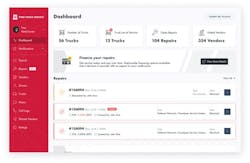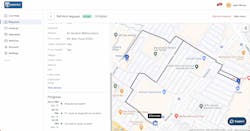Reliable roadside help: How modern service locator apps find trusted vendors
Key Highlights
- Mobile repair apps streamline the process of finding reliable service providers with features like geolocation, filtering, and real-time updates, saving fleets time and money.
- Vetting processes, including ownership checks and satellite imagery verification, help ensure that only reputable vendors are listed, reducing the risk of fraud and subpar service.
- Customer ratings and reviews, when properly managed, provide valuable insights but should be interpreted cautiously due to potential manipulation by unscrupulous operators.
- The shift from traditional methods to digital platforms enhances transparency, accountability, and decision-making for fleet managers dealing with breakdowns and repairs.
Pity the poor drivers of years past. If they broke down far from home, their search for a repair facility often ended at a bank of pay phones in a truck stop. Shrouded in cigarette smoke and packed with drivers waiting for their next load, the walls were covered with business cards from local service providers. It was fortunate those cards were there, because most of the truck repair listings in the Yellow Pages had already been torn out.
Sourcing a mobile repair provider is much easier today. It’s still fraught with risk, though not from the nicotine clouds.
You’re not a regular customer, so you lack leverage. You have little bargaining power on door rates and labor rates. Parts? Ha, what’s 30 or 40% among friends? And of course, you have very little control over the skill of the technician who is working on your precious truck.
So, where do you start? Google searches and websites have replaced stained business cards, but they are still imperfect solutions—unless you have hours to spend scrolling through service listings.
Now, truck service locator apps and fleet management platforms dominate the breakdown space. Providers such as TruckDown, Trucker Path, and Find Truck Service offer fleets fast access to reliable local repair services.
Benefits of service provider locator apps
These features help fleets minimize downtime by streamlining the process of finding and selecting emergency repair services.
Rapid Search, Filtering, and Verification: Fleets can quickly locate and verify qualified repair vendors nationwide, reducing the time spent searching and vetting.
Centralized Repair Management Dashboard: Fleets can track active repairs, vendor assignments, and truck statuses in real time, ensuring more efficient breakdown management.
Data-Driven Insights and Transparency: Optimize and simplify vendor selection using aggregated repair histories, vendor performance, and cost/speed/quality metrics.
Up-to-Date Availability: These apps’ large user base means information on service locations, services, and parking availability is updated frequently, supporting better decision-making during emergencies.
Seamless Communication and Documentation: Platforms can link repair tickets to specific trucks, drivers, and vendors, providing a clear record of actions taken, completion times, and communication history.
These platforms maintain nationwide directories of repair shops, roadside service providers, towing, tire services, diagnostics, and parts suppliers. Listings are vetted and updated to ensure accuracy. Geolocation capabilities identify qualified shops in the truck’s immediate vicinity or within a specified radius.
This functionality reduces downtime by quickly connecting fleets to the right service provider and allows filtering by capability. It also helps manage repair costs by enabling price comparisons and, in some cases, tracking historical repair expenses.
Fleets can make better decisions when they have all the facts.
Ratings and reviews
Even if the vendor passes muster with the platform monitors, the way they treat customers out in the field is also under scrutiny.
During the first three years of operation, TruckDown built up a base of regular fleet users. Bob Toews, president of TruckDown Info International, knows fleets can get pretty vocal when they get burned.
“We listened carefully to what fleets were telling us and introduced a rating system. As ratings increased, we could see there were distinct patterns of behavior around vendors that were happy to take advantage of customers,” he said. “These vendors typically fall into two groups. First, vendors with actual facilities and service trucks that routinely overcharge and underperform, and second, vendors that don’t exist.”
Internally, they are called “service call brokers.” The goal of their advertising is to draw in unsuspecting fleets with promises of great service and pricing. Then they turn around and broker the call to a real vendor and just mark the costs way up.
These operators are not to be confused with the legitimate managed services in the industry, such as FleetNet America by Cox Automotive. Legitimate managed services tell their customers upfront that they can arrange repairs but will add a fee.
“Call-brokers flat-out lie about their services and disappear if something goes wrong with the actual repair,” Toews pointed out.
And then they have someone post a positive review.
So, can you trust ratings and customer reviews? They can be helpful, but it’s probably better to base the buying decision on some other factor.
“In my experience, not many people go out of their way to leave positive reviews,” said Advic. “They are more likely to say something if they are unhappy and the problem isn’t resolved.”
Or, unscrupulous operators can try to damage a competitor’s reputation with bad reviews or low ratings, but there are ways to minimize that.
“We do police against that as best we can,” said Oliver. “If all of a sudden a vendor gets 30 reviews in two days, that looks a little suspicious. It’s probably a bot of a customer writing and distributing reviews with AI. We guard against that with our own bots.”
At TruckDown the company only allows verified fleets with registered accounts to rate their vendor services, and each fleet rating is reviewed for compliance by employees using TruckDown’s rating policies before they are released to the vendor.
Who are you dealing with?
Platform-based or online vendor directories make it easier to find appropriate service providers, while often revealing previous user experiences with that vendor.
TruckDown, for example, draws on 28 years of fleet-reported ratings. According to Toews, vendors undergo thorough vetting.
“We have banned vendors because of past behavior,” Toews told Fleet Maintenance. “Our internal verification process includes ownership checks, address verification, phone number validation, and other steps.”
Other reputable service directory platforms do the same in the name of customer satisfaction.
Find Truck Service follows a similar process. Vendors must indicate which services they are equipped to provide. According to founder and CEO Amer Avdic, most applicants check five to 10 boxes on a service list.
“The ones you have to watch are the ones that check every box,” Avdic told Fleet Maintenance. “It’s not impossible, but very rare. Misleading information results in removal from our platform.”
Companies are warned ahead of time that such deception will get them kicked off the platform, Avdic said.
Some wannabe vendors can get pretty creative. Toews and Avdic shared stories of suppliers who had sent in photographs of their service trucks, which were actually some other company’s well-equipped and professional-looking service trucks, with a different logo photoshopped onto the image.
Others send fanciful photos of well-equipped shops, whereas the address associated with the application is a third-floor walk-up on the Lower East Side.
“We start with a look at Google Earth satellite view to see if the business actually exists, and whether or not there really is room for trucks,” said Chris Oliver, CMO at Trucker Path.
It doesn’t take much to weed out some of the bogus players.
“After nearly 18 years in the business, I’ve seen and heard just about everything,” Advic said.
By the time you locate a potential service provider through one of these platforms, you can be pretty confident you’re dealing with a reputable company.
Tow your woes away
Most small and mid-sized fleets don’t maintain nationwide towing relationships. When a breakdown happens, they usually resort to a quick online search.
Tow4Tech, founded two and a half years ago by Craig Schneider, streamlines that process with a geo-located platform linking fleets to a vetted network of towing providers in mere minutes.
“In many markets, we get responses from multiple tow companies in under two minutes,” he told Fleet Maintenance. “And 100% of the time we’re assigning a vendor and dispatching a truck in under five minutes.”
Read more: Tow4Tech out to wreck predatory towing with innovative platform
Schneider plans to eventually expand across North America and Europe, pushing a very simple proposition: “By connecting fleet managers directly with top-tier tow operators, we’re creating a win-win for both industries.”
Tow4Tech tracks every event, billing either per-use or via monthly subscription. The user pays $99 and the towing companies keep 100% of their service charges. The platform also ensures quality through vetting by the platform and through fleet feedback, which Schneider said “practically eliminates the risk of predatory operators.”
Darry Stuart, president and CEO of DWS Fleet Management Services, noted that negotiating with towers is notoriously difficult: “Tow truck operators are the toughest people in the world to negotiate with. It’s next to impossible to build relationships with companies you hopefully only deal with once.”
Ryder has been working in Florida with the company, and is so far impressed.
“Tow4Tech brings speed, transparency, and automation to a process that has historically lacked all three,” said Jenn Dixon, VP of maintenance technology at Ryder. “Their innovative platform makes it easier for our teams to coordinate roadside assistance, and we’re excited to expand our pilot throughout Florida as they continue to build out their platform.”
About the Author

Jim Park
Jim Park is an award-winning journalist who has covered the trucking industry since 1998. Prior to that, he racked up 2 million miles as a driver and owner-operator pulling tank trailers over-the-road. He continues to maintain his CLD.
Jim's previous driving experience brings a real-world perspective to his work. Jim's strong suits are equipment and technical matters, emerging technology, vehicle spec'ing, safety, and driver issues. He has hosted an overnight radio show for truckers, produced many technical and training videos, and has published three research papers on driver fatigue and the driver shortage. He has earned 9 Jesse H. Neal awards, including “Best Range of Work by a Single Author” in 2020.


